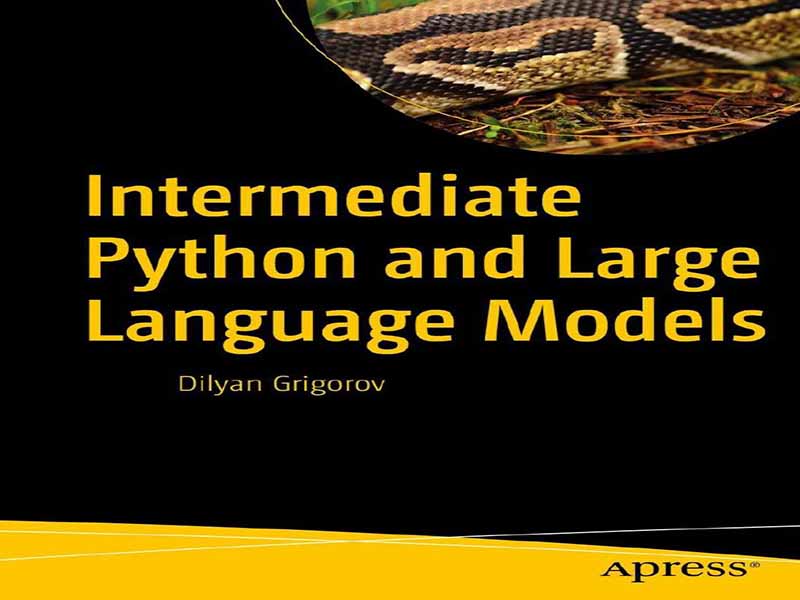- عنوان کتاب: Intermediate Python and Large Language Models
- نویسنده: Dilyan Grigorov
- حوزه: مدل زبانی
- سال انتشار: 2025
- تعداد صفحه: 342
- زبان اصلی: انگلیسی
- نوع فایل: pdf
- حجم فایل: 3.10 مگابایت
تکامل هوش مصنوعی (AI) عصر جدیدی از امکانات را آغاز کرده است که نحوه تعامل ما با فناوری، خودکارسازی وظایف و حل مشکلات پیچیده را متحول میکند. در قلب این انقلاب، مدلهای زبانی بزرگ (LLM) قرار دارند که برنامههای کاربردی از عوامل مکالمهای گرفته تا تولید محتوا، بازیابی دادهها و فراتر از آن را قدرتمند میکنند. این کتاب به عنوان یک راهنمای جامع پیشرفته برای درک، توسعه و استقرار برنامههای کاربردی مبتنی بر LLM، با تمرکز پیشرفته بر پایتون و LangChain، عمل میکند. این کتاب برای علاقهمندان به هوش مصنوعی، دانشمندان داده، مهندسان یادگیری ماشین، توسعهدهندگان و محققانی طراحی شده است که به دنبال تعمیق درک خود از LLMها و برنامههای کاربردی دنیای واقعی آنها هستند. این کتاب شکاف بین تئوری و عمل را پر میکند و یک نقشه راه برای ساخت سیستمهای هوشمند پیشرفته که از قدرت مدلهای زبانی بهره میبرند، ارائه میدهد. در طول فصلها، من بر یادگیری عملی، ارائه مثالهای کد، بهترین شیوهها و استراتژیهای عیبیابی برای کمک به شما در ساخت برنامههای کاربردی کارآمد و مؤثر مبتنی بر هوش مصنوعی تأکید میکنم. در پایان سفر خود، پایه و اساس محکمی در LLMها و توانایی اعمال آنها در طیف وسیعی از چالشهای دنیای واقعی خواهید داشت. این کتاب به چندین فصل کلیدی تقسیم شده است که هر کدام بر جنبهای حیاتی از کار با LLMها و LangChain تمرکز دارند. • فصل ۱ – LangChain و پایتون: مبانی: این فصل اصول اولیه LangChain، یک چارچوب قدرتمند برای ادغام LLMها در برنامهها را معرفی میکند. این فصل مفاهیم پیشرفته اصلی، از جمله زنجیرهها، حافظه، ابزارها و عاملها، همراه با نحوه ساختاردهی موثر اعلانها برای وظایف مختلف را پوشش میدهد. • فصل ۲ – LangChain و پایتون: اجزای پیشرفته: این فصل با تکیه بر اصول اولیه، ویژگیهای پیشرفته LangChain، مانند مدیریت حافظه، سیستمهای چندعاملی و ادغام دادههای خارجی را بررسی میکند. خوانندگان یاد خواهند گرفت که برنامههایی با آگاهی زمینهای و سازگاری ایجاد کنند. • فصل ۳ – ساخت برنامههای پیشرفته با پشتیبانی LLMها با LangChain و پایتون: این فصل به توسعه برنامههای کاربردی عملی با استفاده از LangChain و پایتون میپردازد. این فصل شامل مثالهای دنیای واقعی مانند خلاصهکنندههای ویدیوی YouTube و ابزارهای بازیابی اسناد است که نحوه پیادهسازی گردشهای کاری پیشرفته و بهینهسازی عملکرد مدل را نشان میدهد. • فصل ۴ – استقرار برنامههای کاربردی مبتنی بر LLM: پس از ساخت یک برنامه LLM، استقرار مؤثر آن بسیار مهم است. این فصل استراتژیهای استقرار ابری، راهحلهای ارائه مدل، تکنیکهای بهینهسازی و بهترین شیوهها برای تضمین مقیاسپذیری، امنیت و عملکرد در محیطهای تولید را پوشش میدهد. • فصل ۵ – ساخت و تنظیم دقیق LLMها: برای کسانی که به دنبال سفارشیسازی بیشتر هستند، این فصل اصول آموزش و تنظیم دقیق LLMها را توضیح میدهد. در این فصل معماریهای ترانسفورماتور، الگوهای پیش از آموزش، استراتژیهای تنظیم دقیق و ملاحظات اخلاقی در استقرار مسئولانه هوش مصنوعی مورد بحث قرار میگیرد.
The evolution of artificial intelligence (AI) has ushered in a new era of possibilities, transforming the way we interact with technology, automate tasks, and solve complex problems. At the heart of this revolution are large language models (LLMs), which power applications ranging from conversational agents to content generation, data retrieval, and beyond. This book serves as an advanced comprehensive guide to understanding, developing, and deploying LLM-powered applications, with an advanced focus on Python and LangChain. It is designed for AI enthusiasts, data scientists, machine learning engineers, developers, and researchers who are looking to deepen their understanding of LLMs and their real-world applications. The book bridges the gap between theory and practice, providing a road map for building advanced intelligent systems that leverage the power of language models. Throughout the chapters, I emphasize hands-on learning, providing code examples, best practices, and troubleshooting strategies to help you build efficient and effective AI-driven applications. By the end of your journey, you will have a strong foundation in LLMs and the ability to apply them to a wide range of real-world challenges. The book is divided into several key chapters, each focusing on a critical aspect of working with LLMs and LangChain. • Chapter 1—LangChain and Python: Basics: This chapter introduces the fundamentals of LangChain, a powerful framework for integrating LLMs into applications. It covers the core advanced concepts, including chains, memory, tools, and agents, along with how to structure prompts effectively for different tasks. • Chapter 2—LangChain and Python: Advanced Components: Building on the basics, this chapter explores LangChain’s advanced features, such as memory management, multiagent systems, and external data integrations. Readers will learn to create applications with contextual awareness and adaptability. • Chapter 3—Building Advanced Applications Powered by LLMs with LangChain and Python: This chapter delves into the development of practical applications using LangChain and Python. It includes real-world examples like YouTube video summarizers and document retrieval tools, demonstrating how to implement advanced workflows and optimize model performance. • Chapter 4—Deploying LLM-Powered Applications: Once an LLM application is built, deploying it effectively is crucial. This chapter covers cloud deployment strategies, model-serving solutions, optimization techniques, and best practices for ensuring scalability, security, and performance in production environments. • Chapter 5—Building and Fine-Tuning LLMs: For those looking to take customization further, this chapter explains the principles of training and fine-tuning LLMs. It discusses transformer architectures, pretraining paradigms, fine-tuning strategies, and ethical considerations in deploying AI responsibly.
این کتاب را میتوانید از لینک زیر بصورت رایگان دانلود کنید:




































نظرات کاربران